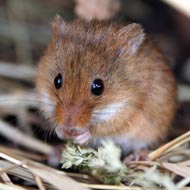
Project aims to find out more about the elusive mammal
Sniffer dogs have been given a new and unexpected task - to help conservationists find out more about harvest mice.
An iconic species in Britain, the harvest mouse faces threats from farming practices such as combine harvesting, stubble burning and pesticides.
It is thought they have become much scarcer in recent years, but they are so elusive, it is not known how many - or even where - they are. In order to reverse the declines and protect the species, conservationists need more information about this tiny mammal.
Experts may be able to find them by looking for their tell-tale nests, which are woven amongst tall grasses and reeds. However, even these are difficult to find.
Scent is another way of tracking the animals, as mammals often leave scents behind to tell others where they have been. But, this requires far more sensitive noses than ours. Enter the sniffer dog.
A project based at Moulton College in Northamptonshire, funded by the People's Trust for Endangered Species, is using man's best friend to help count harvest mice. It is hoped the dogs will be able to detect more mice than traditional methods.
Previously, dogs have successfully been used to find kiwi birds in New Zealand and pine martins in Scotland.
Image © Chris Barber/Wikimedia Commons/ CC BY 2.0



 The Veterinary Medicines Directorate (VMD) is inviting applications from veterinary students to attend a one-week extramural studies (EMS) placement in July 2026.
The Veterinary Medicines Directorate (VMD) is inviting applications from veterinary students to attend a one-week extramural studies (EMS) placement in July 2026.